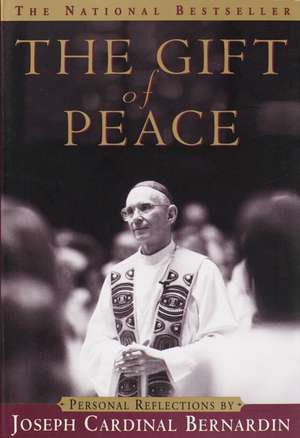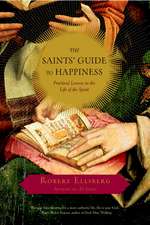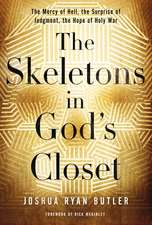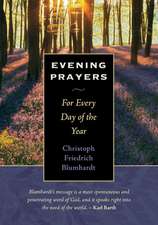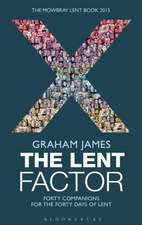The Gift of Peace: Personal Reflections: Illinois
Autor Joseph Cardinal Bernardin, Cardinal Joseph Bernardinen Limba Engleză Paperback – 31 oct 1998
In the last two months of his life, Joseph Cardinal Bernardin made it his ultimate mission to share his personal reflections and insights as a legacy to those he left behind. The Gift of Peace reveals the Cardinal's spiritual growth amid a string of traumatic events: a false accusation of sexual abuse; reconciliation a year later with his accuser, who had earlier recanted the charges; a diagnosis of pancreatic cancer and surgery; the return of cancer, now in his liver; his decision to discontinue chemotherapy and live his remaining days as fully as possible. In these pages, Bernardin tells his story openly and honestly, and shares the profound peace he came to at the end of his life. He accepted his peace as a gift from God, and he in turn now shares that gift with the world.
Preț: 95.29 lei
Nou
Puncte Express: 143
Preț estimativ în valută:
18.23€ • 19.87$ • 15.36£
18.23€ • 19.87$ • 15.36£
Carte disponibilă
Livrare economică 02-16 aprilie
Preluare comenzi: 021 569.72.76
Specificații
Recenzii
“A wonderful book celebrating and showing the way to peace.”
–New York Newsday
“Poignant.”
–Chicago Tribune
“A gem of a book.”
–Publishers Weekly
“This is a book for people of all religions.”
–Columbus Dispatch
“Very moving–written with simplicity and deep wisdom.”
–Library Journal
"A gentle, personal voice."
–USA Today
“This uplifting book testifies to a life well spent–The Cardinal shares with his readers a tremendous trust in the Lord that results in inner peace–Simple true words that can give us all a deeper sense of hope.”
–America
“Overflows with strength and compassion–Bernardin's recipe for personal peace transcends organized religion.”
–Paul Reid, Palm Beach Post
“In his final testament, Cardinal Bernardin urges the dying to bask in the light of each other.”
–Newsweek
“We come to know a humble man who touched many people with love and compassion, without judgment.”
–Hartford Courant
–New York Newsday
“Poignant.”
–Chicago Tribune
“A gem of a book.”
–Publishers Weekly
“This is a book for people of all religions.”
–Columbus Dispatch
“Very moving–written with simplicity and deep wisdom.”
–Library Journal
"A gentle, personal voice."
–USA Today
“This uplifting book testifies to a life well spent–The Cardinal shares with his readers a tremendous trust in the Lord that results in inner peace–Simple true words that can give us all a deeper sense of hope.”
–America
“Overflows with strength and compassion–Bernardin's recipe for personal peace transcends organized religion.”
–Paul Reid, Palm Beach Post
“In his final testament, Cardinal Bernardin urges the dying to bask in the light of each other.”
–Newsweek
“We come to know a humble man who touched many people with love and compassion, without judgment.”
–Hartford Courant
Notă biografică
Joseph Louis Bernardin was born in Columbia, South Carolina, in 1928. He was ordained a priest in 1952 and served as an Auxiliary Bishop of Atlanta (1966-68), general secretary of the National Conference of Catholic Bishops in Washington, D.C. (1968-1972), president of the Conference (1974-1977), and Archbishop of Chicago (1982-1996). He became Cardinal in 1983. Cardinal Bernardin was widely respected for his gentleness, his spirituality, and his ability to reconcile. He received the Medal of Freedom at the White House two months before he died of pancreatic cancer in November 1996.
Extras
"Come to me all you who are weary and find life burdensome."
On August 31, 1996, the day after I announced that the cancer had spread to my liver and was inoperable, I presided at a communal anointing of the sick at Saint Barbara Church in Brookfield, Illinois. I told my fellow sick that, when we are faced with serious illness (or any serious difficulty), we should do several things--things that have given me peace of mind personally.
The first is to put ourselves completely in the hands of the Lord. We must believe that the Lord loves us, embraces us, never abandons us (especially in our most difficult moments). This is what gives us hope in the midst of life's suffering and chaos. It is the same Lord who invites us: "Come to me all you who are weary and find life burdensome, and I will refresh you. Take my yoke upon your shoulders and learn from me, for I am gentle and humble of heart. Your souls will find rest, for my yoke is easy and my burden light" (Mt 11:28-30).
This is a favorite passage of mine and, possibly, one of yours also. It is so comforting, so soothing. Perhaps it also sounds too good to be true. Indeed, further reflection shows that Jesus' message is a bit more complex than it appears at first sight or hearing.
For example, is there not a tension between the "rest" that Jesus offers and the "yoke" he invites us to wear? What did Jesus mean by his "yoke"? The ancient rabbis used to refer to the Mosaic Law as a kind of yoke. But Jesus' metaphor is different because central to his "yoke" or wisdom or law is the Lord himself. He practiced what he preached. He was gentle toward the people he served and humbly obedient to the will of his Father. He called us to love one another and laid down his own life for us. The "rest" he offers us comes from adopting and living each day his attitudes, his values, his mission, his ministry, his willingness to lay down his very life--in whatever circumstances we find ourselves.
What makes Jesus' yoke "easy"? A good yoke is carefully shaped to reduce chafing to a minimum. Jesus promises that his yoke will be kind and gentle to our shoulders, enabling us to carry our load more easily. That is what he means when he says his burden is "light." Actually, it might be quite heavy, but we will find it possible to carry out our responsibilities. Why? Because Jesus will help us. Usually a yoke joined a pair of oxen and made them a team. It is as though Jesus tells us, "Walk alongside me; learn to carry the burdens by observing how I do it. If you let me help you, the heavy labor will seem lighter."
Perhaps, the ultimate burden is death itself. It is often preceded by pain and suffering, sometimes extreme hardships. In my case it is primarily a question of a pervasive fatigue that seems to increase day by day, forcing me to spend much of the day and night lying down. But notice that Jesus did not promise to take away our burdens. He promised to help us carry them. And if we let go of ourselves--and our own resources--and allow the Lord to help us, we will be able to see death not as an enemy or a threat but as a friend.
On August 31, 1996, the day after I announced that the cancer had spread to my liver and was inoperable, I presided at a communal anointing of the sick at Saint Barbara Church in Brookfield, Illinois. I told my fellow sick that, when we are faced with serious illness (or any serious difficulty), we should do several things--things that have given me peace of mind personally.
The first is to put ourselves completely in the hands of the Lord. We must believe that the Lord loves us, embraces us, never abandons us (especially in our most difficult moments). This is what gives us hope in the midst of life's suffering and chaos. It is the same Lord who invites us: "Come to me all you who are weary and find life burdensome, and I will refresh you. Take my yoke upon your shoulders and learn from me, for I am gentle and humble of heart. Your souls will find rest, for my yoke is easy and my burden light" (Mt 11:28-30).
This is a favorite passage of mine and, possibly, one of yours also. It is so comforting, so soothing. Perhaps it also sounds too good to be true. Indeed, further reflection shows that Jesus' message is a bit more complex than it appears at first sight or hearing.
For example, is there not a tension between the "rest" that Jesus offers and the "yoke" he invites us to wear? What did Jesus mean by his "yoke"? The ancient rabbis used to refer to the Mosaic Law as a kind of yoke. But Jesus' metaphor is different because central to his "yoke" or wisdom or law is the Lord himself. He practiced what he preached. He was gentle toward the people he served and humbly obedient to the will of his Father. He called us to love one another and laid down his own life for us. The "rest" he offers us comes from adopting and living each day his attitudes, his values, his mission, his ministry, his willingness to lay down his very life--in whatever circumstances we find ourselves.
What makes Jesus' yoke "easy"? A good yoke is carefully shaped to reduce chafing to a minimum. Jesus promises that his yoke will be kind and gentle to our shoulders, enabling us to carry our load more easily. That is what he means when he says his burden is "light." Actually, it might be quite heavy, but we will find it possible to carry out our responsibilities. Why? Because Jesus will help us. Usually a yoke joined a pair of oxen and made them a team. It is as though Jesus tells us, "Walk alongside me; learn to carry the burdens by observing how I do it. If you let me help you, the heavy labor will seem lighter."
Perhaps, the ultimate burden is death itself. It is often preceded by pain and suffering, sometimes extreme hardships. In my case it is primarily a question of a pervasive fatigue that seems to increase day by day, forcing me to spend much of the day and night lying down. But notice that Jesus did not promise to take away our burdens. He promised to help us carry them. And if we let go of ourselves--and our own resources--and allow the Lord to help us, we will be able to see death not as an enemy or a threat but as a friend.
Descriere
The national bestseller and new spiritual classic is now available for the first time in paperback. In these pages, Joseph Cardinal Bernardin shares the profound peace he came to at the end of his life. "The Gift of Peace" is part of the Cardinal's great legacy of compassion for others.
